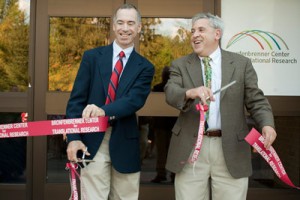By Ted Boscia
Reprinted from Cornell Chronicle, August 31, 2011

Professor John Eckenrode, director of the new Bronfenbrenner Center for Translational Research, which merges the Bronfenbrenner Life Course Center with the Family Life Development Center, celebrates the center's opening with Alan Mathios, dean of the College of Human Ecology. Photo by Robert Barker, University Photography
In a ribbon-cutting ceremony Aug. 30 at Beebe Hall, College of Human Ecology leaders officially opened the new Bronfenbrenner Center for Translational Research (BCTR), which aims to address pressing human needs by linking social and behavioral scientists with community practitioners and policy experts.
Named for famed researcher Urie Bronfenbrenner, a co-founder of the national Head Start program and a world-renowned developmental psychologist who died in 2005, the BCTR formed July 1 with the merger of two longstanding Cornell centers: the Family Life Development Center and the Bronfenbrenner Life Course Center. Its new mission is to extend research-based knowledge to test and strengthen community-based programs, practices and policies, according to BCTR Director John Eckenrode.
"In the spirit of its namesake, the new Bronfenbrenner Center will bridge the gap between research and practice, helping to solve a problem that exists both at Cornell and in society at large," said Eckenrode, professor of human development. "Too often, practitioners view research as esoteric and irrelevant, while researchers perceive application as trivial and unscientific."
The BCTR expands the outreach mission of the College of Human Ecology to further emphasize translational research, inviting community members, practitioners and policymakers as active participants in the discovery process. By connecting researchers with multiple stakeholders, scientists come to understand the community's most urgent needs and develop studies to address those challenges.
"Many programs intended to benefit children, youth, elders and families are not scientifically tested, and insights from basic research are rarely used systematically to guide the development of new programs," Eckenrode said. "When research is translated into practice, the process is often too slow and unsystematic. It is precisely these problems that translational research is intended to address, and this is where the BCTR will make unique contributions."
More than 50 Cornell social and behavioral scientists, as well as professional and support staff members, are affiliated with the BCTR, which will seek to partner with Cornell Cooperative Extension, the Cornell Office for Research and Evaluation, Weill Cornell Medical College's Clinical and Translational Science Center, the Cornell Institute for Social and Economic Research, New York 4-H and many other campus research and training centers.
Examples of BCTR activities include:
- systematic reviews of the scientific literature to inform new research and guide practitioners and decision-makers;
- creation and rigorous testing of interventions to promote healthy development;
- community outreach and community participation in behavioral science research;
- research on the implementation, dissemination and sustainability of evidence-based programs, practices and guidelines; and
- research and development on the translational process itself, studying how best to move research findings into practice and policy.
The center will also train the next generation of scholars in translational research methods through coursework and community projects for Cornell undergraduate and graduate students.
On Sept. 22-23, the BCTR will host the third biennial Urie Bronfenbrenner Conference, with speakers from across the country set to present research on the event's theme, "The Neuroscience of Risky Decision Making." Valerie Reyna, professor of human development, and Vivian Zayas, assistant professor of psychology, are organizing the conference.
Ted Boscia is assistant director of communications for the College of Human Ecology.
Related Links:
College of Human Ecology
Bronfenbrenner Center for Translational Research

